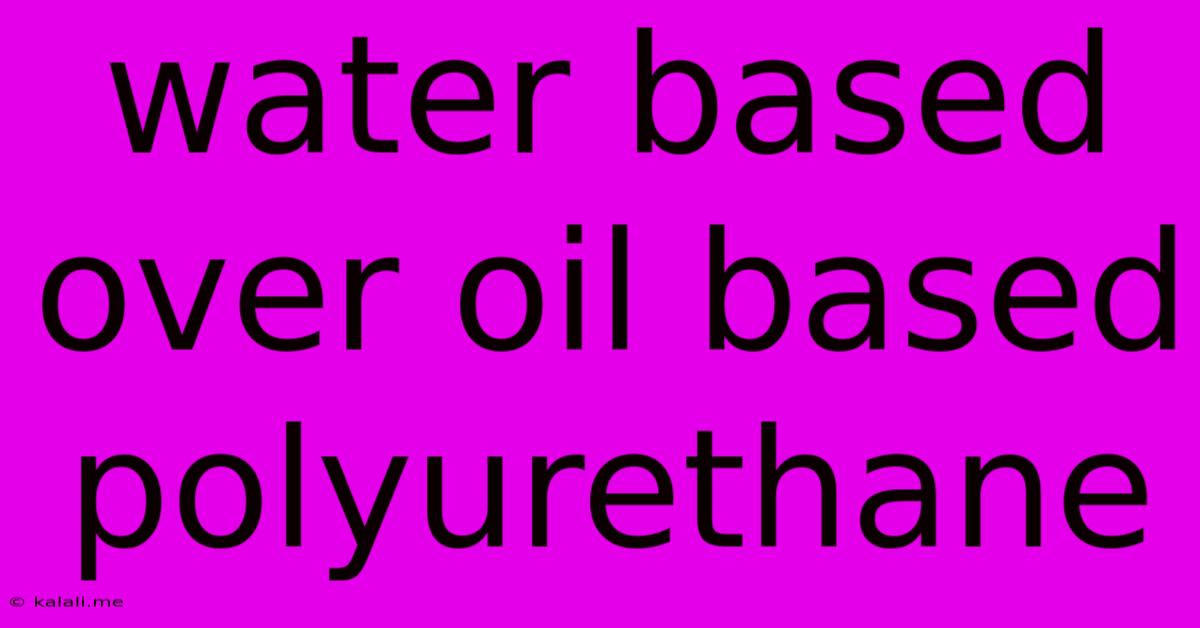Water Based Over Oil Based Polyurethane
Kalali
May 25, 2025 · 3 min read

Table of Contents
Water-Based vs. Oil-Based Polyurethane: Which is Right for Your Project?
Choosing between water-based and oil-based polyurethane can feel overwhelming. Both offer durable finishes, but their application, drying time, and overall impact differ significantly. This guide will break down the key differences, helping you decide which polyurethane best suits your needs. This comprehensive comparison will cover everything from application techniques to cleanup, ensuring you make an informed choice for your next woodworking or DIY project.
What is Polyurethane?
Polyurethane is a protective coating used to seal and protect wood and other surfaces. It creates a hard, durable layer that resists scratches, water damage, and wear. The key difference lies in the solvent used: water or oil.
Water-Based Polyurethane: The Eco-Friendly Choice
Water-based polyurethane has gained popularity due to its lower VOC (volatile organic compound) content, making it a more environmentally friendly option. It’s also typically easier to clean up with soap and water.
Pros:
- Low VOCs: Better for your health and the environment.
- Easy Cleanup: Soap and water are all you need.
- Faster Drying Time: Generally dries quicker than oil-based polyurethane, allowing for faster project completion.
- Less Odor: Produces less of a strong, lingering smell.
- Good for Interior Use: Excellent for furniture, cabinets, and other interior projects.
Cons:
- Less Durable (Sometimes): While advancements have made water-based polyurethane very durable, it might not be as resistant to heavy wear and tear as oil-based in some applications.
- Can Be More Expensive: The price can sometimes be higher than oil-based alternatives.
- Less Flexible: May not be as suitable for projects that experience significant expansion and contraction due to temperature changes.
Oil-Based Polyurethane: The Traditional Workhorse
Oil-based polyurethane has been a long-standing favorite for its superior durability and protective qualities. However, it comes with some drawbacks compared to its water-based counterpart.
Pros:
- Superior Durability: Offers exceptional protection against scratches and wear, ideal for high-traffic areas.
- Greater Flexibility: Better suited for projects subjected to temperature fluctuations.
- Excellent Water Resistance: Provides superior protection against water damage.
- Smoother Finish: Often yields a glossier, more even finish.
Cons:
- High VOCs: Releases more volatile organic compounds, impacting indoor air quality.
- Difficult Cleanup: Requires mineral spirits or other solvents for cleanup.
- Longer Drying Time: Takes significantly longer to dry, potentially extending project timelines.
- Strong Odor: Has a strong, pungent odor that can linger for a considerable time.
- Yellowing: Over time, oil-based polyurethane can yellow, especially in areas exposed to sunlight.
Choosing the Right Polyurethane: A Quick Guide
Consider these factors when deciding which type of polyurethane to use:
- Application: For high-traffic areas or outdoor projects requiring extreme durability, oil-based might be preferable. For interior projects where ease of use and low odor are priorities, water-based is a good choice.
- Environmental Concerns: If minimizing your environmental impact is a concern, water-based polyurethane is the clear winner.
- Budget: Water-based can sometimes be more expensive per gallon, but the quicker drying time and easier cleanup can save you time.
- Finish: If a very high gloss finish is desired, oil-based may provide slightly better results.
Ultimately, the best polyurethane depends on your specific project requirements and personal preferences. Weigh the pros and cons carefully before making your decision, and always follow the manufacturer's instructions for optimal results. Remember to always work in a well-ventilated area, regardless of the type of polyurethane you choose.
Latest Posts
Latest Posts
-
How Long To Let Caulk Dry Before Showering
May 25, 2025
-
How Do I Use Diatomaceous Earth
May 25, 2025
-
Wiring A Outlet From A Switch
May 25, 2025
-
Can You Breed Fish In Minecraft
May 25, 2025
-
What Is A 3 Way Bulb
May 25, 2025
Related Post
Thank you for visiting our website which covers about Water Based Over Oil Based Polyurethane . We hope the information provided has been useful to you. Feel free to contact us if you have any questions or need further assistance. See you next time and don't miss to bookmark.